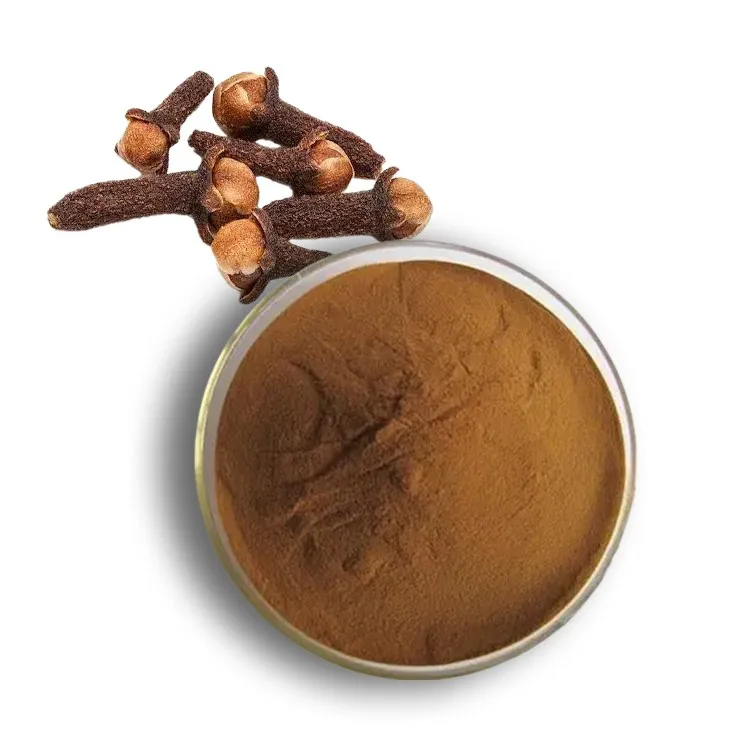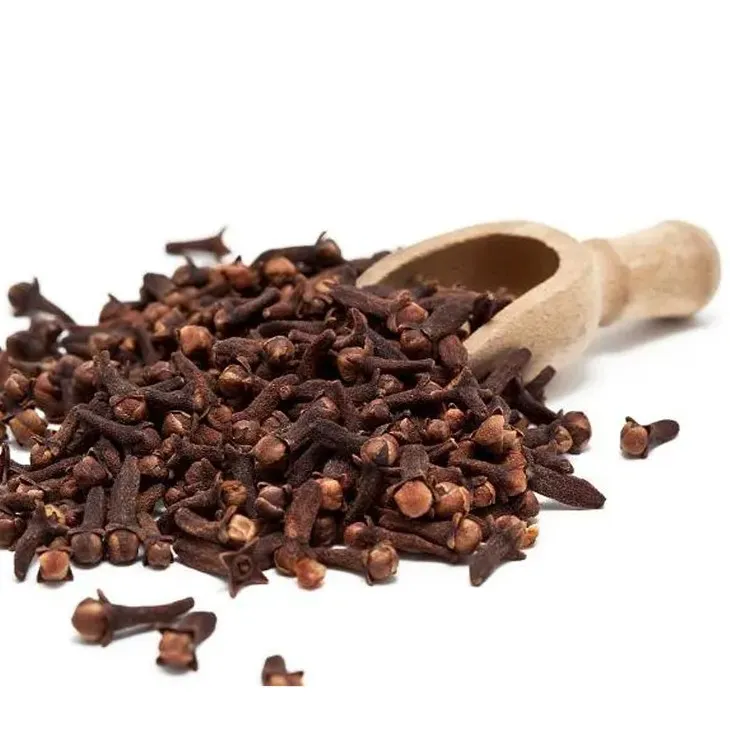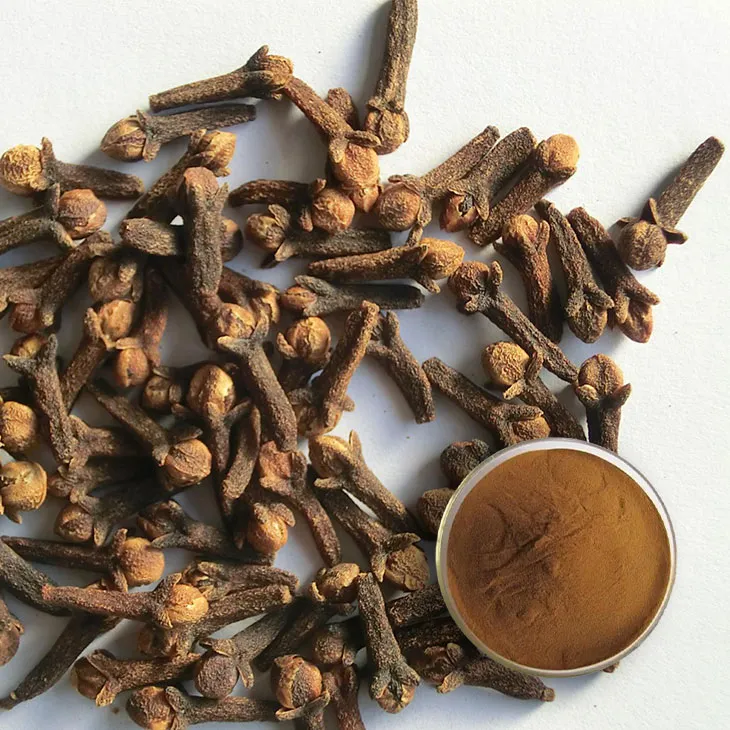- 0086-571-85302990
- sales@greenskybio.com
Clove powder: nature's best - kept secret.
2024-11-14

Introduction to Clove Powder
Clove Powder is a remarkable product that has been somewhat of a hidden gem in nature. Derived from the dried flower buds of the clove tree (Syzygium aromaticum), it has a rich history and a wealth of properties that make it truly special.
The clove buds are harvested when they are still in their immature state, and then they are dried and ground into a fine powder. This powder has a distinctively warm, sweet, and spicy aroma that is instantly recognizable.

Production of Clove Powder
Harvesting
The process of producing clove powder begins with the careful harvesting of the clove buds. Clove trees typically grow in tropical regions, such as Indonesia, Madagascar, and Tanzania. The buds are hand - picked at the right time to ensure optimal quality.
- Harvesters need to be experienced to recognize when the buds are ready for picking. If they are picked too early, they may not have developed their full flavor potential. If they are picked too late, they may start to open and lose some of their essential oils.
- The ideal time for harvesting is when the buds are a deep red color and have reached a certain size, indicating that they are fully formed but still in their immature state.
Drying
After harvesting, the next step is drying. This is a crucial stage in the production of clove powder.
- The freshly picked buds are spread out in a single layer on drying racks or mats. They are usually dried in the sun, but in some cases, artificial drying methods may be used to control the process more precisely.
- The drying process can take several days to a week, depending on the weather conditions and the thickness of the buds. During this time, the buds gradually lose their moisture content, which helps to preserve them and intensify their flavor.
- It is important to monitor the drying process carefully to prevent mold or spoilage. If the buds are not dried properly, they can develop mold, which will ruin the entire batch.
Grinding
Once the buds are completely dried, they are ready to be ground into powder.
- Traditional methods may involve using a mortar and pestle to grind the dried buds into a coarse powder. However, in modern production, mechanical grinders are often used to achieve a finer and more consistent texture.
- The grinding process should be carried out carefully to ensure that the powder is not over - heated, as excessive heat can cause the loss of some of the volatile oils that give clove powder its characteristic aroma and flavor.

Traditional Applications of Clove Powder
Culinary Uses
Clove powder has a long - standing tradition in the culinary world, especially in Asian, Middle Eastern, and African cuisines.
- In Indian cuisine, it is a key ingredient in many spice blends, such as garam masala. It adds a warm, spicy note to curries, rice dishes, and meat preparations. For example, in a classic chicken curry, a small amount of clove powder can enhance the overall flavor profile, giving it a more complex and rich taste.
- In Middle Eastern cooking, it is often used in the preparation of sweet and savory dishes. In Moroccan tagines, for instance, clove powder can be added to the blend of spices that season the slow - cooked meat and vegetables, creating a unique and inviting aroma.
- African cuisines also make use of clove powder. In some West African stews, it can be used to add depth of flavor to the richly spiced broths that are often made with a combination of meats, vegetables, and legumes.
Medicinal Uses in Traditional Medicine
Throughout history, clove powder has been valued for its medicinal properties in various traditional medicine systems.
- In Ayurvedic medicine, which has its roots in India, clove powder has been used to treat digestive problems. It is believed to stimulate digestion, relieve flatulence, and improve appetite. Clove oil, which can be extracted from the powder, has also been used topically to relieve toothache. The analgesic and antibacterial properties of clove make it a natural remedy for oral health issues.
- Traditional Chinese medicine has also recognized the value of clove powder. It has been used in herbal formulations to warm the body, treat colds and coughs, and improve circulation. For example, in some traditional Chinese herbal teas, a small amount of clove powder may be added to help with respiratory problems.

Modern Applications of Clove Powder
Food and Beverage Industry
In the modern food and beverage industry, clove powder continues to play an important role.
- It is used in the production of baked goods, such as cakes, cookies, and bread. The warm, spicy flavor of clove powder pairs well with sweet ingredients like cinnamon and nutmeg, creating a delicious and inviting flavor combination. In a spiced apple cake, for example, clove powder can add a unique depth of flavor that sets it apart from other cakes.
- In the beverage industry, clove powder can be used to flavor hot drinks like mulled wine and cider. It can also be found in some herbal teas, either on its own or as part of a blend. The addition of clove powder to these beverages gives them a warm and comforting quality, especially during the cold winter months.
Health and Wellness
With the growing interest in natural remedies and alternative medicine, clove powder has found new applications in the health and wellness sector.
- Research has shown that clove powder contains compounds with antioxidant properties. These antioxidants can help to protect the body against free radical damage, which is associated with various diseases such as cancer and heart disease. As a result, clove powder is being incorporated into some dietary supplements aimed at promoting overall health.
- Clove powder is also being studied for its potential anti - inflammatory effects. Inflammation is a key factor in many chronic diseases, and natural anti - inflammatory agents like clove powder are of great interest. Some topical creams and ointments containing clove powder or its extracts are being developed for the treatment of skin conditions related to inflammation.
Cosmetics and Personal Care
Clove powder has made its way into the cosmetics and personal care industry as well.
- In skincare products, it can be used for its antibacterial and antifungal properties. It may be added to face masks, scrubs, or creams to help combat acne - causing bacteria and keep the skin clean and healthy. For example, a natural face mask made with clay, honey, and a small amount of clove powder can be effective in treating oily and acne - prone skin.
- In haircare, clove powder can be used to promote a healthy scalp. Its antifungal properties can help to prevent dandruff and other scalp infections. Some natural hair oils and shampoos may contain clove powder or its extracts to improve the overall health of the hair and scalp.
Reasons for its Relatively Unknown Status
Despite its many valuable properties and applications, clove powder has remained a relatively unknown part of nature in some respects.
- One reason may be the lack of widespread marketing. Compared to more common spices like salt, pepper, and cinnamon, clove powder has not been as aggressively promoted in mainstream markets. This may be due in part to its more specialized uses and the fact that it is not as familiar to the average consumer.
- Another factor could be the limited availability in some regions. While it is widely produced in tropical countries, its distribution to other parts of the world may not be as extensive as that of other more commonly used ingredients. This can make it less accessible to consumers who are not located near areas where it is readily available.
Conclusion
Clove powder is truly nature's best - kept secret. Its production process, from harvesting to grinding, is a testament to its natural origin and the care that goes into creating this valuable product. With its wide - ranging applications in traditional and modern scenarios, from culinary delights to health and wellness products, it has much to offer.
However, due to factors such as lack of marketing and limited availability, it has remained relatively unknown to many. As more research is conducted on its properties and benefits, and as the demand for natural and sustainable products grows, it is possible that clove powder will gain more recognition and become a more commonly used ingredient in the future.
FAQ:
What is clove powder?
Clove powder is made from dried cloves. Cloves are the flower buds of the Syzygium aromaticum tree. The buds are dried and then ground into a fine powder. It has a strong, warm, and spicy flavor and aroma.
How is clove powder produced?
First, the cloves are harvested when they are in the bud stage. Then they are carefully dried, either in the sun or using artificial drying methods. Once dried thoroughly, the cloves are ground using a grinder or mill until they reach a powder - like consistency.
What are the traditional applications of clove powder?
In traditional medicine, clove powder has been used for various purposes. It was often used to relieve toothache due to its numbing and antibacterial properties. In cooking, it is a common spice in many cuisines, especially in Asian and Middle - Eastern cooking. It is used in spice blends, marinades, and baked goods to add flavor.
What are the modern applications of clove powder?
Modernly, clove powder is still used in dentistry for its antiseptic properties. It is also used in the cosmetic industry in products like toothpaste, mouthwash, and some skincare products. In aromatherapy, the scent of clove powder can be relaxing and invigorating.
Why is clove powder relatively unknown?
Despite its many uses, clove powder may be relatively unknown because it is often overshadowed by more common spices. Also, in the modern context, synthetic alternatives are sometimes used in place of natural clove powder in some mass - produced products, reducing its visibility.
Related literature
- The Clove: A Comprehensive Review of Its Botany, Chemistry, and Pharmacology"
- "Clove Powder in Traditional and Modern Therapeutics"
- "The Role of Clove Powder in Culinary Arts and Gastronomy"
- ▶ Hesperidin
- ▶ Citrus Bioflavonoids
- ▶ Plant Extract
- ▶ lycopene
- ▶ Diosmin
- ▶ Grape seed extract
- ▶ Sea buckthorn Juice Powder
- ▶ Fruit Juice Powder
- ▶ Hops Extract
- ▶ Artichoke Extract
- ▶ Mushroom extract
- ▶ Astaxanthin
- ▶ Green Tea Extract
- ▶ Curcumin
- ▶ Horse Chestnut Extract
- ▶ Other Product
- ▶ Boswellia Serrata Extract
- ▶ Resveratrol
- ▶ Marigold Extract
- ▶ Grape Leaf Extract
- ▶ New Product
- ▶ Aminolevulinic acid
- ▶ Cranberry Extract
- ▶ Red Yeast Rice
- ▶ Red Wine Extract
-
Lemon Extract
2024-11-14
-
Natural grape seed extract
2024-11-14
-
Chaste Berry Extract
2024-11-14
-
Tormentil Extract
2024-11-14
-
Red Wine Extract
2024-11-14
-
Saw Palmetto Extract
2024-11-14
-
Thunder God Vine Extract
2024-11-14
-
Sophora Flavescens Root Extract
2024-11-14
-
Bitter Melon Extract
2024-11-14
-
Yellow Pine Extract
2024-11-14





















